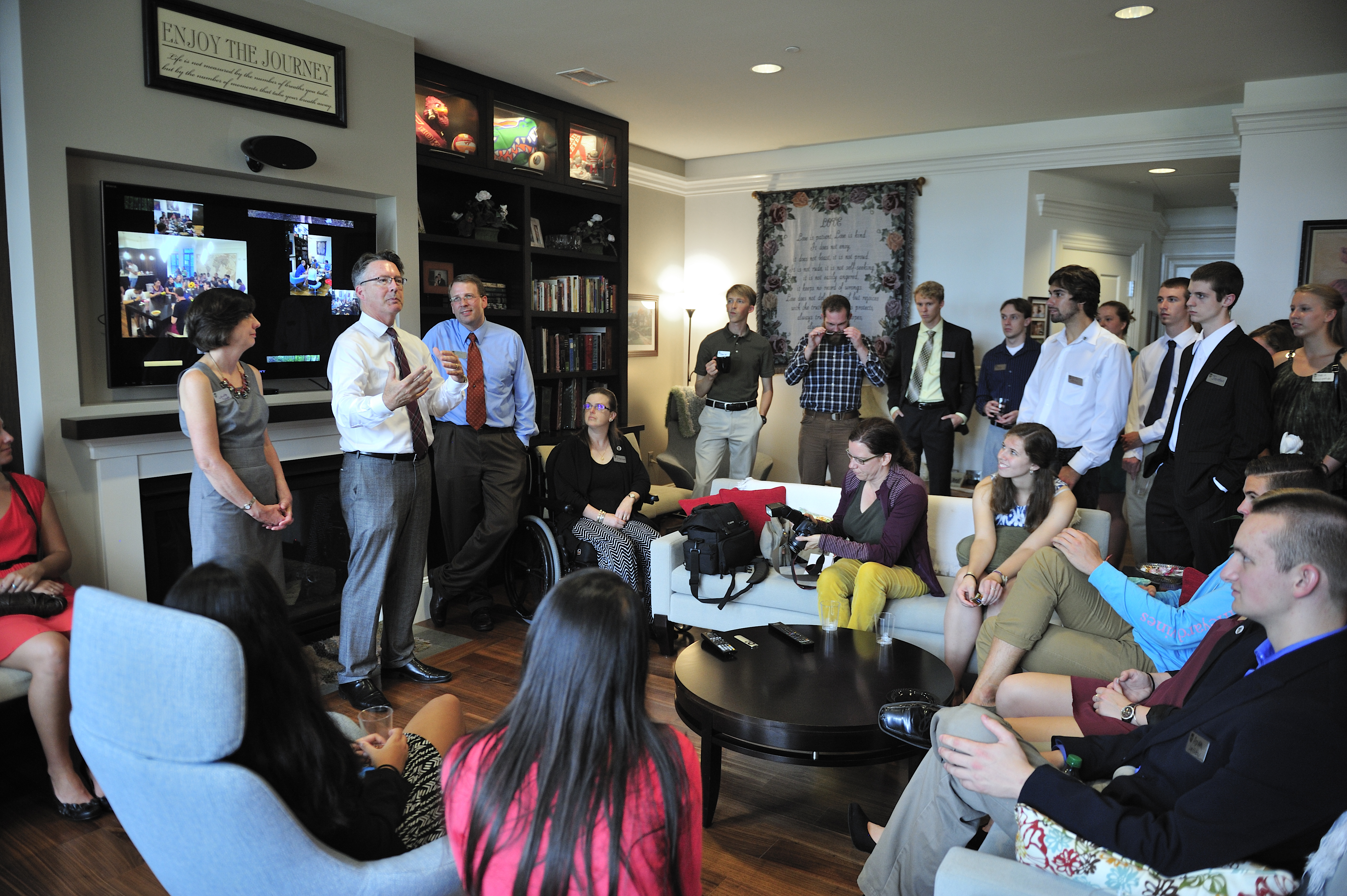Faculty principals — and their families — impact student life in residential colleges

Both Rachel Gabriele and Shevon Kaufman had positive reactions to the idea of moving their families into a residence hall when their husbands broached the topic over a year ago.
“She was enthusiastic about it,” said Matt Gabriele, an associate professor in the Department of Religion and Culture and faculty principal in the Residential College at West Ambler Johnston. “Students and faculty have a defined relationship in the classroom, but when you come into a student space and there’s not a defined role for you, it becomes awkward and uncomfortable. We were both excited to break down those walls.”
Eric Kaufman, an associate professor and extension specialist in the Department of Agricultural, Leadership, and Community Education and faculty principal in the Honors Residential College, said he off-handedly mentioned the notion to his wife. She was excited about interacting with students and told Kaufman to get involved immediately.
With their families, both faculty principals are embarking on their second year as the live-in intellectual leaders of the Residential College at West Ambler Johnston and the Honors Residential College at East Ambler Johnston. The residential college concept fosters learning through intentionally structured collaborations among faculty, student affairs professionals, and students.
“While living-learning communities are often discipline-specific, residential colleges are fundamentally multidisciplinary,” said Frank Shushok, senior associate vice president for student affairs and associate professor of higher education. “We want the engineer living next to the physicist, next to the poet, next to the history major. While ‘dorms’ have been seen as places for students to eat and sleep while getting an education, a residential college is designed to be part of the fabric of a student’s education.”
“As far as enhancing learning, we do a better job with the more diversity we have here,” said Kaufman. “When these students can learn from people who are different from them, it makes for a richer learning experience.”
Faculty principals collaborate with the Division of Student Affairs to intentionally create a community of growth and learning within the residential colleges. They participate in service events such as Relay for Life and The Big Event, host seminars led by various faculty members, organize movie nights, and eat dinner on campus with their residents.
“Sometimes, the best way to empower our students is to give a little bit of encouragement but then get out of the way and let them do great things,” said Kaufman. He added that his experience as a faculty member has allowed him to spend more time doing the things he loves to do: working with students in non-formal learning situations.
Early last spring, a student approached the Gabrieles about hosting an open mic night in West Ambler Johnston. The Gabrieles set up their apartment to look like a coffee shop, and students took ownership of the event.
“Nearly 100 people showed up, and the event went on for over three hours,” said Gabriele. “People were comfortable sharing art they had created, even in front of faculty in attendance. Those things are rare outside of a residential college. We simply create opportunities for people to be in the same place so that they can talk to one another.
“Coming from a background in the humanities, living in the Residential College has only emphasized what I already try to do in the classroom – spark discussion, generate questions. Living here, I just get to do a lot more of it,” said Gabriele.
Joe Jajonie of Virginia Beach, Virginia, a senior double-majoring in building construction and real estate in the College of Architecture and Urban Studies, was randomly placed in the Residential College at West Ambler Johnston for his first year at Virginia Tech, but he chose to stay within the community for the entirety of his college career.
“It enables students to create their home away from home, foster new relationships, and apply the knowledge gained from continued education,” said Jajonie. “Residential colleges give students skills and knowledge to take an active role in society, provides the opportunity to learn in and out of the classroom, and serves as a great arena in which students learn tolerance and respect for others, even if they think differently from you.”
“The fact that the HRC has a live-in professor with whom I frequently engage has brought me into relationships with tons of faculty,” said Lauren Cashman of Yorktown, Virginia, a senior majoring in biological systems engineering in the College of Engineering. “Working with faculty has made my whole life rich with people who care about my success and have means of bringing me closer to it.”
Written by Holly Paulette.



.jpg.transform/m-medium/image.jpg)
